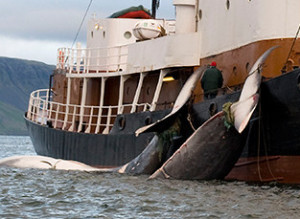The Conservative government is facing tough questions about why it is allowing meat from endangered whales to be shipped across Canada.
In February, it emerged that the federal government allowed an Icelandic company to transport meat from endangered fin whales across Canada on its way to market in Japan. Twelve shipping containers of the meat arrived in Halifax and, according to Greenpeace, were transported by train to ports in British Columbia.
At the time, Environment Canada told the Vancouver Sun that Canada was obligated to allow the transport of the meat despite the fact that fin whales have been given the highest level of protection under the Convention on Trade in Endangered Species (CITES), which Canada has signed. Atlantic Fin whales are also of "special concern" under Canada's Species at Risk Act.
Environment Canada told the Toronto Sun that "CITES permit requirements do not apply to the transit or trans-shipment of specimens through or in the territory of a party while the shipments remain in Customs control."
Both Germany and the Netherlands have turned away Icelandic ships carrying fin whale meat.
More than 65,000 Canadians have since signed a Greenpeace petition calling on Canada to do the same.
On Thursday, NDP MP Don Davies referenced the petition and asked why the government has yet to do anything to stop the traffic in an endangered species.
International Trade Minister Ed Fast replied that he will take the question "under advisement", before pivoting to an attack on the NDP's stance on trade.
Unperturbed, Davies asked Fast if he will heed Foreign Affairs Minister John Baird's call earlier this year to protect threatened species "before it's too late."
Fast answered that all trade in Canada takes place in accordance with Canadian and international law.
"We stand up for the protection of endangered species," Fast said.
Despite a global crackdown on commercial whaling , Japan, Iceland, Norway and the Faroe Islands all continue to hunt the animals. Iceland caught at least 137 fin whales during its hunt this year.
In September, the European Union, United States, Australia, Brazil, Israel, New Zealand, Mexico and Monaco lodged a formal diplomatic protest expressing opposition to Iceland's commercial hunt. Iceland answered that it uses "sustainable" fishing practices and will carry on whaling.
Original Article
Source: huffingtonpost.ca/
Author: Michael Bolen
In February, it emerged that the federal government allowed an Icelandic company to transport meat from endangered fin whales across Canada on its way to market in Japan. Twelve shipping containers of the meat arrived in Halifax and, according to Greenpeace, were transported by train to ports in British Columbia.
At the time, Environment Canada told the Vancouver Sun that Canada was obligated to allow the transport of the meat despite the fact that fin whales have been given the highest level of protection under the Convention on Trade in Endangered Species (CITES), which Canada has signed. Atlantic Fin whales are also of "special concern" under Canada's Species at Risk Act.
Environment Canada told the Toronto Sun that "CITES permit requirements do not apply to the transit or trans-shipment of specimens through or in the territory of a party while the shipments remain in Customs control."
Both Germany and the Netherlands have turned away Icelandic ships carrying fin whale meat.
More than 65,000 Canadians have since signed a Greenpeace petition calling on Canada to do the same.
On Thursday, NDP MP Don Davies referenced the petition and asked why the government has yet to do anything to stop the traffic in an endangered species.
International Trade Minister Ed Fast replied that he will take the question "under advisement", before pivoting to an attack on the NDP's stance on trade.
Unperturbed, Davies asked Fast if he will heed Foreign Affairs Minister John Baird's call earlier this year to protect threatened species "before it's too late."
Fast answered that all trade in Canada takes place in accordance with Canadian and international law.
"We stand up for the protection of endangered species," Fast said.
Despite a global crackdown on commercial whaling , Japan, Iceland, Norway and the Faroe Islands all continue to hunt the animals. Iceland caught at least 137 fin whales during its hunt this year.
In September, the European Union, United States, Australia, Brazil, Israel, New Zealand, Mexico and Monaco lodged a formal diplomatic protest expressing opposition to Iceland's commercial hunt. Iceland answered that it uses "sustainable" fishing practices and will carry on whaling.
Original Article
Source: huffingtonpost.ca/
Author: Michael Bolen

No comments:
Post a Comment